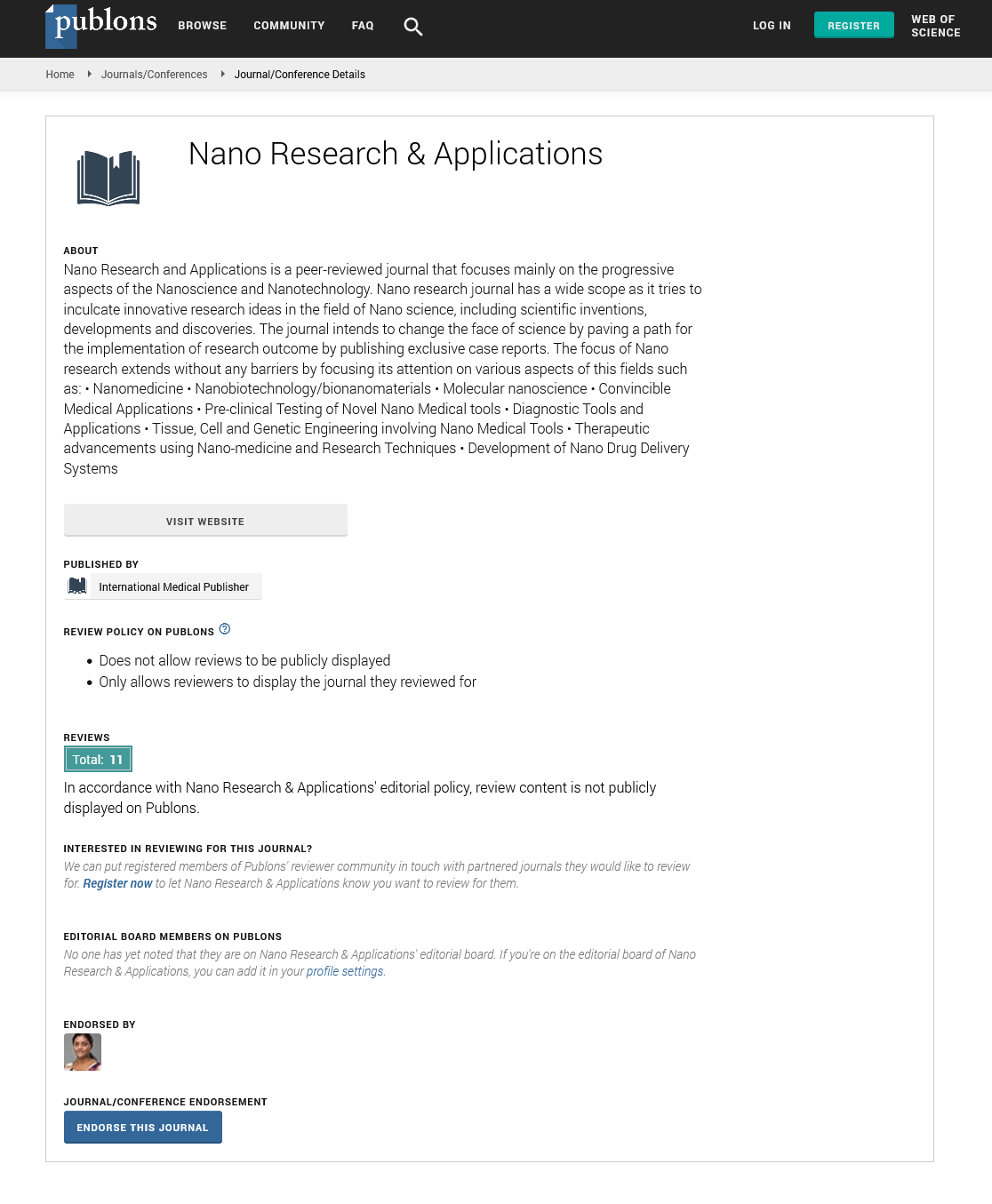ISSN : 2471-9838
Nano Research & Applications
Synthesis of sub-10 nm ibuprofen drug molecular clusters via RESS processing
EuroSciCon Conference on Nanotech & Nanobiotechnology Nano
July 12-13, 2018 Paris , France
Sudhir Kumar Sharma and Ramesh Jagannathan
New York University Abu Dhabi, UAE
ScientificTracks Abstracts: Nano Res Appl
DOI: 10.21767/2471-9838-C2-011
Abstract
One of the major unsolved problems in pharmaceutical drug development is the poor water solubility of many active pharmaceutical ingredients (APIs) and hence reduced bioavailability. One of the preferred strategies to address this problem was to leverage the increased solubility with decreasing drug particle size. However, an ideal solution would be to eliminate the problem of solubility entirely, by reducing the API size to clusters of a few molecules, bound by weak, Vander Waal’s forces that would readily dissociate into molecules, during enteral or parenteral drug delivery process. In order to have commercial impact, such molecular clusters should also be produced in sufficiently high yield. In our research, we have successfully addressed both these challenges. We report the precipitation of molecular clusters of ibuprofen using a rapid expansion of super critical solution (RESS) system. Our custom designed liquid N2 cooled collection process of the molecular clusters embedded in dry ice, resulted in yields of up to 80% (w/w). Ambient dissolution of the dry ice in deionized water resulted in a stable dispersion, for up to six months, as confirmed by DLS and AFM characterizations. DLS measurements showed that PEI surfactant (Mw ~400,000) produced the smallest particle size of 7 nm, with a narrow size distribution of ±3 nm. Drop casting of these dispersions on silicon and sapphire substrates resulted in high quality, liquid like viscous films as observed by optical microscopy and AFM. XRD and confocal Raman characterizations confirmed that the molecular clusters retained their chemical identity of ibuprofen. Besides its scientific importance, this invention is expected to open up new drug delivery platforms.
Biography
Sudhir Kumar Sharma obtained his Masters’ degree (MSc Physics and M. Tech-Materials) from Department of Physics, Barkatullah University Bhopal, India. He received his PhD from the Indian Institute of Science Bangalore, India. He joined as Postdoc fellow at Centre for Nano Science and Engineering (CeNSE), IISc. Bangalore, India. Later he moved to New York University Abu Dhabi UAE (NYU Abu Dhabi) as a Research Associate in 2013. Currently, he is working as a Research Scientist at NYU Abu Dhabi. His publication record includes more than 30 journals and 60 conference presentations. His research interest includes implementation of supercritical technologies for nanoparticle synthesis, smart materials for micro-sensors and actuators, micro/nano- fabrications, vacuum science, and thin film technology.
E-mail: sks16@nyu.edu
Google Scholar citation report
Citations : 387
Nano Research & Applications received 387 citations as per Google Scholar report
Nano Research & Applications peer review process verified at publons
Abstracted/Indexed in
- Google Scholar
- China National Knowledge Infrastructure (CNKI)
- Directory of Research Journal Indexing (DRJI)
- WorldCat
- Publons
- Secret Search Engine Labs
- Euro Pub
Open Access Journals
- Aquaculture & Veterinary Science
- Chemistry & Chemical Sciences
- Clinical Sciences
- Engineering
- General Science
- Genetics & Molecular Biology
- Health Care & Nursing
- Immunology & Microbiology
- Materials Science
- Mathematics & Physics
- Medical Sciences
- Neurology & Psychiatry
- Oncology & Cancer Science
- Pharmaceutical Sciences
